
Piazza: The Heartbeat of Addis Ababa
Piazza is a vibrant neighborhood in Addis Ababa that captures the essence of Ethiopia's rich history and dynamic culture. Known for its bustling streets, colonial-era architecture, and an eclectic mix of shops and cafés, Piazza is a must-visit for anyone looking to experience the soul of the city. Strolling through Piazza, you'll find a fascinating blend of old and new. Historical landmarks like the St. George's Cathedral and the Taitu Hotel—the oldest hotel in Ethiopia—offer a glimpse into the past. Meanwhile, modern boutiques and restaurants showcase the contemporary side of Addis Ababa, making it a perfect spot for both history buffs and modern-day explorers. The neighborhood is also a hub for art and culture. The vibrant markets overflow with traditional crafts, while local eateries serve up mouth-watering Ethiopian dishes. Whether you're people-watching at a café or exploring the local shops, Piazza offers an authentic taste of Addis Ababa that is both captivating and enriching.
Local tips in Piazza
- Wear comfortable walking shoes; the area is best explored on foot.
- Visit St. George's Cathedral for a dose of history and stunning architecture.
- Try traditional Ethiopian coffee at one of the local cafés.
- Bargain at the markets for the best prices on local crafts and souvenirs.
- Keep an eye on your belongings, as the area can get crowded.
Piazza: The Heartbeat of Addis Ababa
Piazza is a vibrant neighborhood in Addis Ababa that captures the essence of Ethiopia's rich history and dynamic culture. Known for its bustling streets, colonial-era architecture, and an eclectic mix of shops and cafés, Piazza is a must-visit for anyone looking to experience the soul of the city. Strolling through Piazza, you'll find a fascinating blend of old and new. Historical landmarks like the St. George's Cathedral and the Taitu Hotel—the oldest hotel in Ethiopia—offer a glimpse into the past. Meanwhile, modern boutiques and restaurants showcase the contemporary side of Addis Ababa, making it a perfect spot for both history buffs and modern-day explorers. The neighborhood is also a hub for art and culture. The vibrant markets overflow with traditional crafts, while local eateries serve up mouth-watering Ethiopian dishes. Whether you're people-watching at a café or exploring the local shops, Piazza offers an authentic taste of Addis Ababa that is both captivating and enriching.
Iconic landmarks you can’t miss
6 Kilo Yekatit 12 Square
Explore the vibrant historical significance of 6 Kilo Yekatit 12 Square, a cultural hub in Addis Ababa that captures the spirit of Ethiopia.
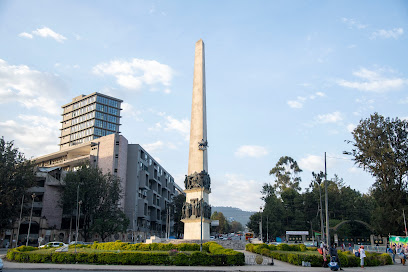
Emperor Tewodros II Square
Explore the historic Emperor Tewodros II Square in Addis Ababa - a vibrant tribute to Ethiopia's heritage and a lively hub of local culture.
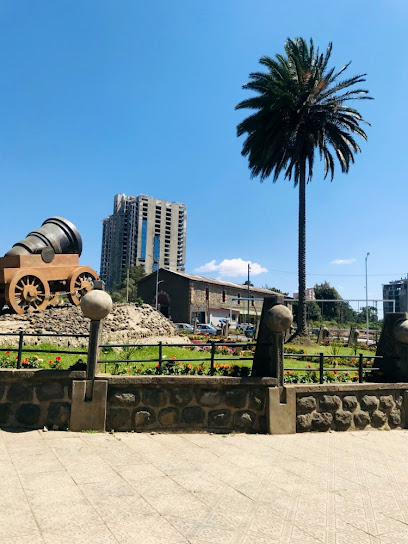
Piassa, Degol Square
Discover the vibrant cultural heart of Addis Ababa at Piassa, Degol Square, a historic landmark filled with charm and local flavor.
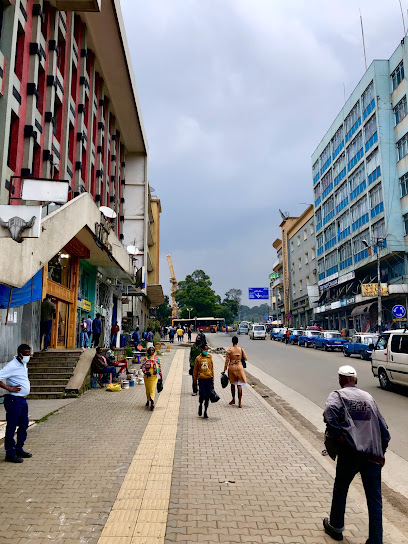
Abune Petros Memorial | Piazza | የአቡነ ጴጥሮስ ሐውልት | ፒያሳ
Discover the Abune Petros Memorial in Addis Ababa, a historical landmark celebrating Ethiopian heritage and the legacy of a revered saint.
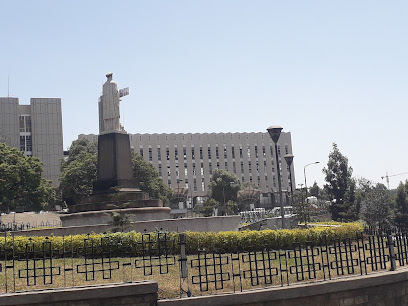
ምኒልክ አደባባይ | Menelik Square
Explore Menelik Square in Addis Ababa: A historical monument honoring Emperor Menelik II and a vibrant hub of local culture and heritage.
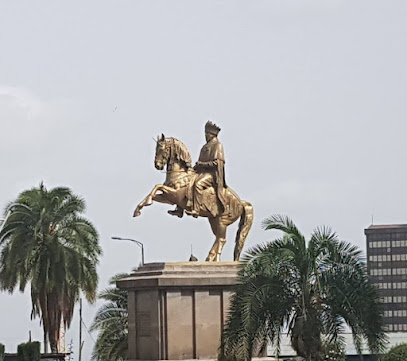
Arat Killo Monument
Discover the Arat Killo Monument in Addis Ababa: A remarkable historical landmark showcasing Ethiopia's rich culture and heritage.
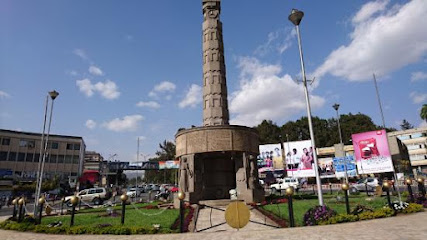
Miyazya 27 Victory Statue
Discover the Miyazya 27 Victory Statue in Addis Ababa, a tribute to Ethiopian resilience and a captivating landmark for every traveler.
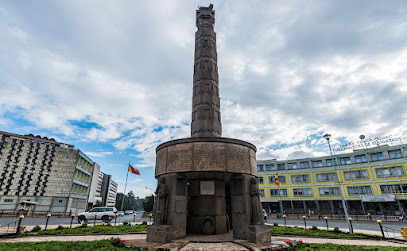
ARBA DEREJA አርባ ደረጃ
Experience the historical significance and cultural richness of Arba Dereja, a landmark that embodies Ethiopia's enduring heritage.
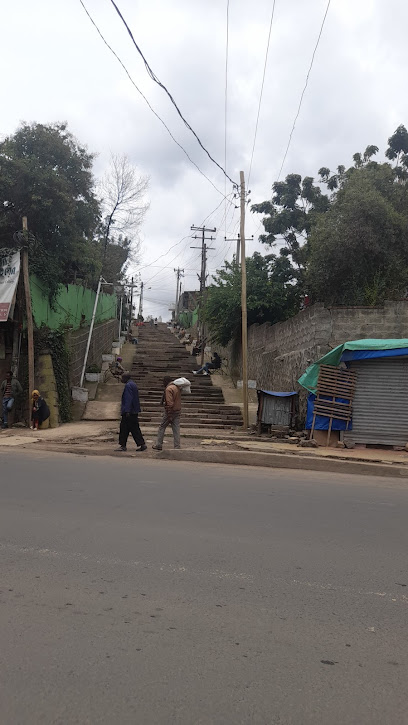
Victory Monument የድል ሀውልት
Discover the rich history and vibrant culture at the Victory Monument in Addis Ababa, a symbol of Ethiopia's independence and resilience.
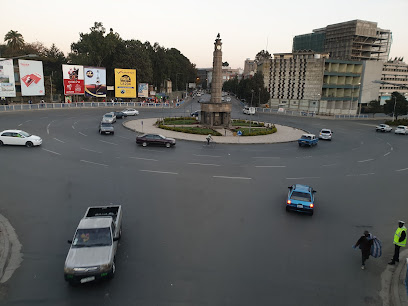
Martyr Monument የሰማእታት መታሰቢያ ሀውልት
Explore the Martyr Monument in Addis Ababa, a powerful symbol of resilience and a tribute to Ethiopia's rich history and cultural heritage.
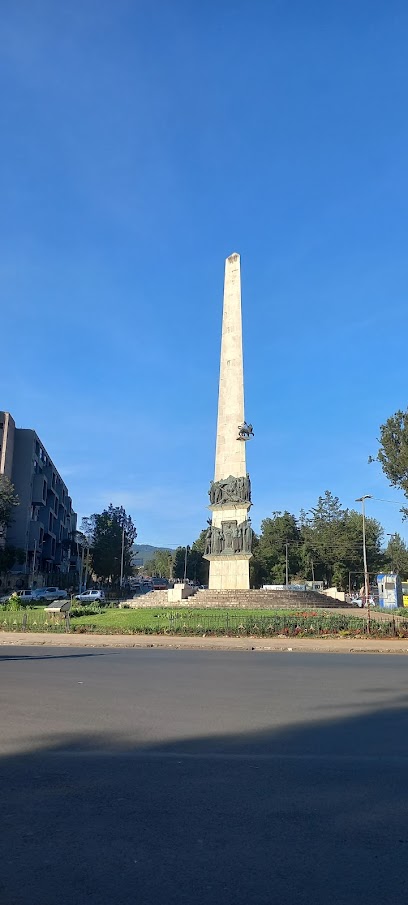
Unmissable attractions to see
Lion Park
Explore Lion Park in Addis Ababa, a vibrant wildlife haven showcasing Ethiopia's natural beauty and diverse fauna in a serene park setting.
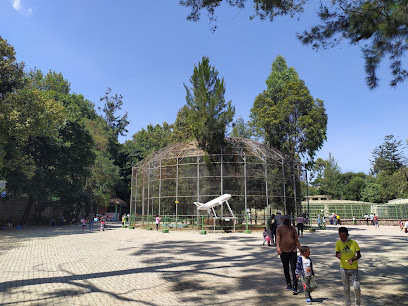
Eden Art Gallery
Discover the artistic soul of Ethiopia at Eden Art Gallery, where tradition meets modern creativity in the vibrant heart of Addis Ababa.
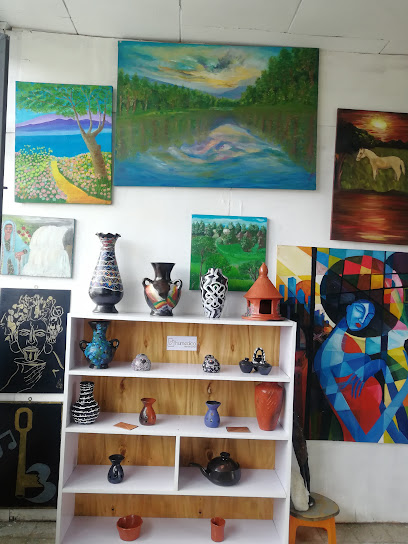
Essential places to dine
Meskott Culinary Experience
Experience authentic Ethiopian flavors at Meskott Culinary Experience – where tradition meets innovation in every dish.
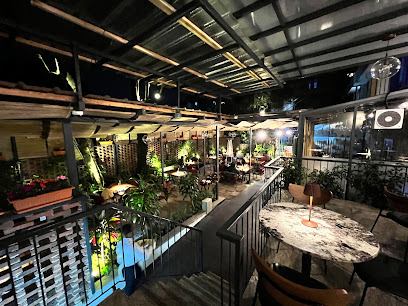
Addis Ababa Restaurant | Piazza |
Discover authentic Ethiopian cuisine at this charming restaurant in Piazza, Addis Ababa - where every dish tells a story.
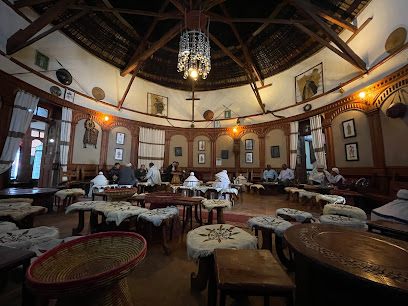
Omna Bar and Restaurant
Discover the flavors of Ethiopia at Omna Bar and Restaurant in Addis Ababa – where tradition meets innovation in every dish.
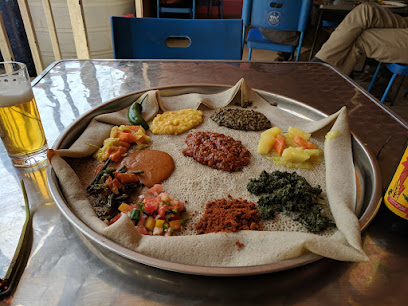
Wina Juice & burger
Experience the vibrant flavors of vegetarian cuisine at Wina Juice & Burger in Addis Ababa – where freshness meets creativity.
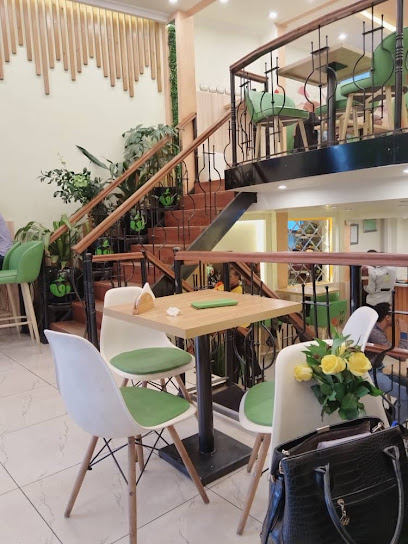
ዞብል
Savor authentic Ethiopian flavors at ዞብል in Addis Ababa - where every meal tells a story.
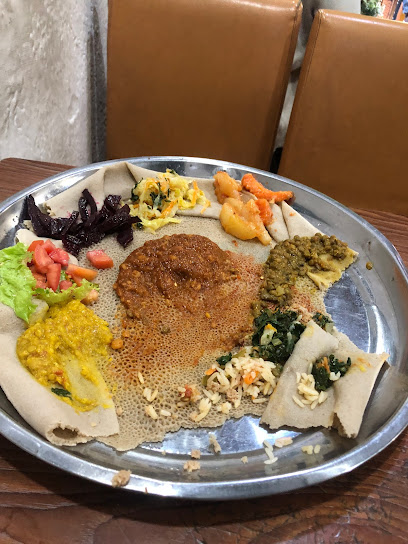
Restaurant
Experience authentic Ethiopian seafood at this charming fish restaurant in Addis Ababa's vibrant Arada district.
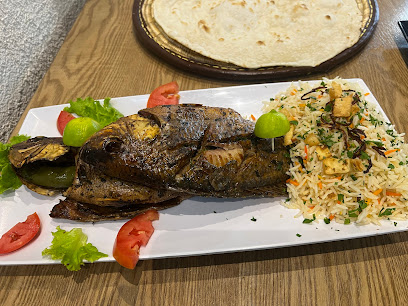
Arada Giyorgis
Discover authentic Ethiopian flavors at Arada Giyorgis in Addis Ababa - a culinary gem for every food lover.

Fasika Bar&Res.
Discover the rich flavors of Ethiopia at Fasika Bar & Restaurant in Addis Ababa—where traditional dishes meet warm hospitality.

Surprise Restaurant
Discover authentic Ethiopian flavors at Surprise Restaurant, where every dish tells a story of tradition and taste in Addis Ababa.

Le Grand Reve Specialized Beligian Restaurant
Discover authentic Belgian cuisine at Le Grand Reve in Addis Ababa – a culinary gem offering traditional dishes and exceptional service.

Markets, malls and hidden boutiques
Piyasa
Explore the heart of Addis Ababa at Piyasa, a vibrant gift shop offering authentic Ethiopian crafts and unique souvenirs to cherish forever.

Abdi Negash Antique Store
Explore unique antiques and art at Abdi Negash Antique Store, Addis Ababa's cultural treasure trove for discerning travelers.
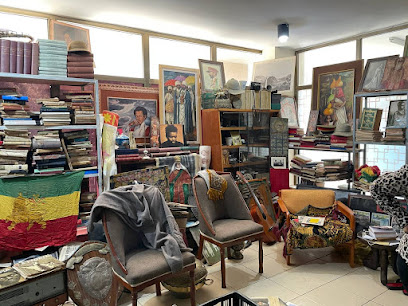
Piazza Arada building 3rd floor
Explore the heart of Ethiopia's craftsmanship at Piazza Arada Gift Shop, where every item tells a story and every visit is a new adventure.

Tsehay perfumery and cosmetics
Explore the rich fragrances of Ethiopia at Tsehay Perfumery, a must-visit destination for tourists seeking unique beauty products in Addis Ababa.

Alem Fashion
Discover unique Ethiopian fashion at Alem Fashion, a boutique in Addis Ababa where tradition meets modern style.

U2 Fashion
Explore U2 Fashion in Addis Ababa for unique clothing and accessories that blend modern style with traditional Ethiopian craftsmanship.

G store Zewiditu building piassa Addis ababa
Explore G Store in Addis Ababa's Piassa area for unique Ethiopian fashion and handcrafted artisan goods that embody the rich culture and creativity of the region.
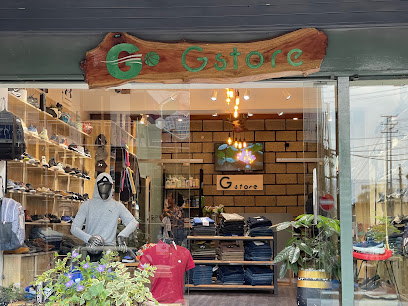
HD fashion
Explore HD Fashion in Addis Ababa for authentic Ethiopian gifts and unique fashion pieces that reflect the vibrant local culture.

UG Style
Explore the unique blend of traditional Ethiopian craftsmanship and contemporary fashion at UG Style Boutique in Addis Ababa.

Astopia
Discover unique handcrafted gifts and authentic Ethiopian souvenirs at Astopia, the premier gift shop in Addis Ababa.

Essential bars & hidden hideouts
Fun Zone Lounge
Experience the vibrant social scene of Addis Ababa at Fun Zone Lounge, where comfort meets culture in a stylish setting.

Old Town Lounge+bar
Experience the vibrant atmosphere of Old Town Lounge + Bar in Addis Ababa, where locals and tourists gather for delightful drinks and lively conversations.
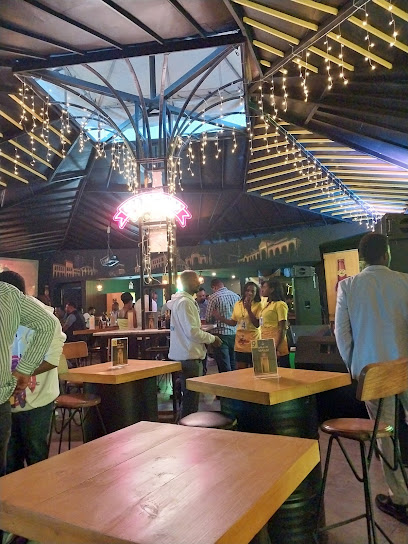
Pension Bar
Discover the charm of Pension Bar in Addis Ababa, a cozy spot for drinks and cultural immersion in a lively atmosphere.

Sunshine Bar | Piazza | ሰንሻይን ባር | ፒያሳ
Discover the vibrant nightlife of Addis Ababa at Sunshine Bar, where locals and tourists mingle over delightful drinks and lively music.
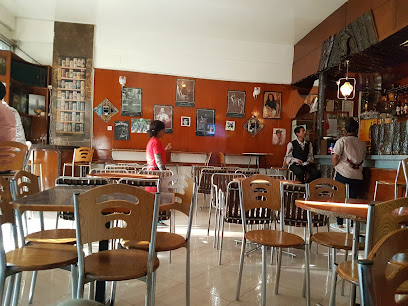
Girar Bar
Experience the vibrant culture and nightlife of Addis Ababa at Girar Bar, a lively destination for drinks and socializing.

dejach weba pepsl bar&ristouranet
Discover the lively ambiance of Dejach Weba Pepsl Bar & Ristouranet, where Ethiopian hospitality meets spirited nightlife in the heart of Addis Ababa.
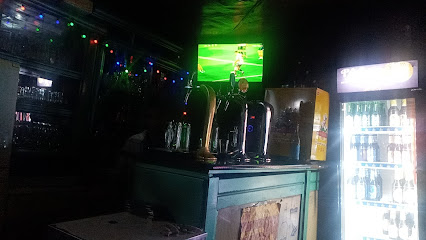
Mekdi lounge
Experience the vibrant nightlife of Addis Ababa at Mekdi Lounge, where local culture meets a lively bar atmosphere in the heart of the city.

Che Bar & Restaurant
Experience the vibrant atmosphere and authentic flavors at Che Bar & Restaurant in Addis Ababa, a perfect blend of tradition and modernity.

አብዛ ግሮሰሪ
Discover the vibrant nightlife of Addis Ababa at አብዛ ግሮሰሪ, where local culture meets a lively bar atmosphere.

Mehal arada view bar and restaurant
Discover the vibrant atmosphere and breathtaking views at Mehal Arada View Bar and Restaurant in Addis Ababa, perfect for unwinding and enjoying Ethiopian cuisine.

Local Phrases
-
- Helloሰላም
[sälam] - Goodbyeዋላ ለሁላችሁ
[walä lähulachihu] - Yesአዎ
[aw] - Noአይ
[ay] - Please/You're welcomeእገልገለሁ
[egelgelehu] - Thank youአመሰግናለሁ
[amäsägənalähu] - Excuse me/Sorryበዚህ ተቀብሎ ማለት ነው
[bəzih täkäbälo malät näw] - How are you?እንዴት ነህ?
[əndät näh] - Fine. And you?ጠብቀህ አሰራለሁ. እንዴት?
[täbäkäh asäralähu. əndät] - Do you speak English?እንዴት እንፈታለን?
[əndät ənäftalän] - I don't understandአልተኛም
[alənä'm]
- Helloሰላም
-
- I'd like to see the menu, pleaseመኪናው እየለም ለመመለስ ብለህ
[mäkinaw yälem lämämläs bäläh] - I don't eat meatአልምታውን አልመጋ
[aləmtawän alämäga] - Cheers!ሃሪብ!
[hari'b] - I would like to pay, pleaseብቻ ብሎ እየለም
[bicha bəlo yälem]
- I'd like to see the menu, pleaseመኪናው እየለም ለመመለስ ብለህ
-
- Help!እንዴት!
[əndät] - Go away!እኩሌ!
[əkule] - Call the Police!ፖሊስን አውጥቷል!
[polisən awət'äl] - Call a doctor!ስራፍን አውጥቷል!
[sarafən awət'äl] - I'm lostእኔ ተመሳሳይ ነኝ
[ənä tämsasay näg] - I'm illእኔ ተጋለጥሁ
[ənä tägäla'təhu]
- Help!እንዴት!
-
- I'd like to buy...ለማወቅ ለእስራኤል...
[lämawäk läəsra'äl] - I'm just lookingየምንደኛውን
[yämändägänawän] - How much is it?በእስራኤል ሁለት ማምለክ ነው?
[bäsra'äl hulät mämäläk näw] - That's too expensiveእንስራኤል ነው
[änsra'äl näw] - Can you lower the price?ምንም ማምለክ በትን ቀረብ እንድን?
[mänäm mämäläk bätän kärab əndän]
- I'd like to buy...ለማወቅ ለእስራኤል...
-
- What time is it?ሰባተኛው ሰዓት ምንድን ነው?
[säbatänaw sä'at mindän näw] - It's one o'clockአንድ ሰዓት ነው
[and sä'at näw] - Half past (10)ሐሙስ ሰዓት እንዴት
[hamus sä'at əndät] - Morningጥምቀት
[t'ämäqet] - Afternoonማርያም
[mariyam] - Eveningማታ
[mata] - Yesterdayትናንት
[tanat] - Todayዛሬ
[zarə] - Tomorrowነገ
[nägä] - 1አንድ
[and] - 2ሁለት
[hulät] - 3ሶስት
[sost] - 4አራት
[arat] - 5አምስት
[amsost] - 6ስድስት
[sodost] - 7ሰባት
[säbat] - 8ስምንት
[sämənəst] - 9ዘጠኝ
[zätänä] - 10አስር
[asir]
- What time is it?ሰባተኛው ሰዓት ምንድን ነው?
-
- Where's a/the...?ምን አድራገኝ?
[män adäragän] - What's the address?አስተምህርህ ይሄ ነው?
[astämhärh yih näw] - Can you show me (on the map)?ምንም አሳምሮኛል (በመረጃ)?
[mänäm asaməro'nal (bəmärajä)] - When's the next (bus)?የኛው ባህር ምን አበባዕ?
[yänaw bahar mind abäba'i] - A ticket (to ....)ትኪት አገር (ወይም እንዴት)
[tik'it agär (wäm əndät)]
- Where's a/the...?ምን አድራገኝ?
History of Piazza
-
Piazza is one of the oldest neighborhoods in Addis Ababa, founded shortly after the establishment of the city in 1886 by Emperor Menelik II. The area was initially a bustling center for trade and commerce, attracting merchants and settlers from various regions. Its strategic location made it a pivotal point for economic activities and cultural exchanges, laying the groundwork for Addis Ababa's urban development.
-
During the Italian occupation from 1936 to 1941, Piazza underwent significant changes as the Italians sought to modernize the city. They introduced new architectural styles, transforming the neighborhood with the construction of modern buildings, roads, and public spaces. This period significantly influenced the aesthetic of Piazza, blending Ethiopian traditions with European styles, which can still be seen in the neighborhood today.
-
In the mid-20th century, Piazza emerged as a cultural hub in Addis Ababa, hosting numerous cafes, shops, and cultural institutions. It became a meeting ground for intellectuals, artists, and musicians who contributed to the vibrant cultural life of the city. The neighborhood is renowned for its role in the development of modern Ethiopian music and art, with notable figures such as the celebrated singer Mahmoud Ahmed performing in local venues.
-
During the Derg regime (1974-1991), Piazza experienced significant turmoil as political repression affected daily life. Despite this, the neighborhood retained its cultural vibrancy, becoming a focal point for resistance movements. The resilience of its residents and the importance of Piazza as a cultural and social hub allowed it to maintain its identity amid adversity.
-
In recent years, Piazza has experienced revitalization efforts aimed at restoring its historical charm while accommodating modern development. The neighborhood has seen an influx of cafes, boutiques, and art galleries, attracting both locals and tourists. However, this gentrification has also raised concerns about the displacement of long-time residents and the preservation of its unique cultural heritage.
Piazza Essentials
-
Piazza is centrally located in Addis Ababa and is easily accessible from various parts of the city. From Bole International Airport, taxis are the most convenient option, taking approximately 30 minutes depending on traffic. Alternatively, you can take a blue minibus (taxi) to Piazza from other neighborhoods, with routes available from places like Meskel Square and Merkato.
-
Piazza is a walkable neighborhood, and many attractions are within close proximity. Public transport options include blue minibuses that connect to various parts of the city. Alternatively, you can use ride-hailing apps like Ride or Zayride for more convenience. Bicycles are also available for rent from local shops, providing a unique perspective of the area.
-
Piazza is generally safe, but like any urban area, it is wise to stay aware of your surroundings. Avoid walking alone at night, especially in poorly lit areas. Be cautious of pickpockets in crowded places, particularly near markets. Areas with higher crime rates include parts of Merkato, so it's best to visit during the day and stay vigilant.
-
In case of emergency, dial 911 for police assistance or 944 for medical emergencies. Local hospitals and clinics are available, but having travel insurance that covers medical emergencies is advisable. For minor health issues, pharmacies are scattered throughout the neighborhood where you can purchase over-the-counter medications.
-
Fashion: Do dress modestly, especially in religious settings. Avoid overly revealing clothing. Religion: Do respect local customs; when visiting churches, cover your head if required. Public Transport: Do give up your seat for elderly passengers. Don't eat or drink on public transport. Greetings: Do greet with a handshake; a nod is also respectful. Eating & Drinking: Do try local dishes, and graciously accept food offers. Don't refuse hospitality, as it’s considered rude.
-
To experience Piazza like a local, visit the bustling markets to try street food and shop for local crafts. Engage with vendors and locals, who are often friendly and eager to share stories. Don't miss the historic sites like the Holy Trinity Cathedral and the National Museum, which provide insights into Ethiopia's rich culture and history. Try attending a traditional coffee ceremony for an authentic experience.
Trending Landmarks in Piazza
Nearby Cities to Piazza
-
Things To Do in Debre Markos
-
Things To Do in Awasa
-
Things To Do in Bahir Dar
-
Things To Do in Lalibela
-
Things To Do in Dire Dawa
-
Things To Do in Arba Minch
-
Things To Do in Harar
-
Things To Do in Gondar
-
Things To Do in Jinka
-
Things To Do in Dikhil
-
Things To Do in Ali Sabieh
-
Things To Do in Mekele
-
Things To Do in Arta
-
Things To Do in Tadjoura
-
Things To Do in Djibouti City










